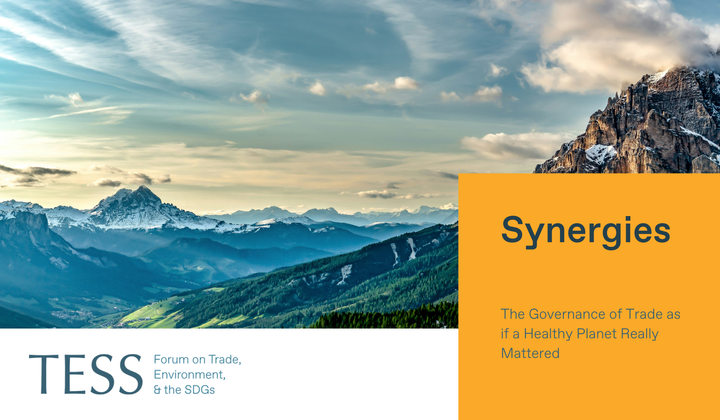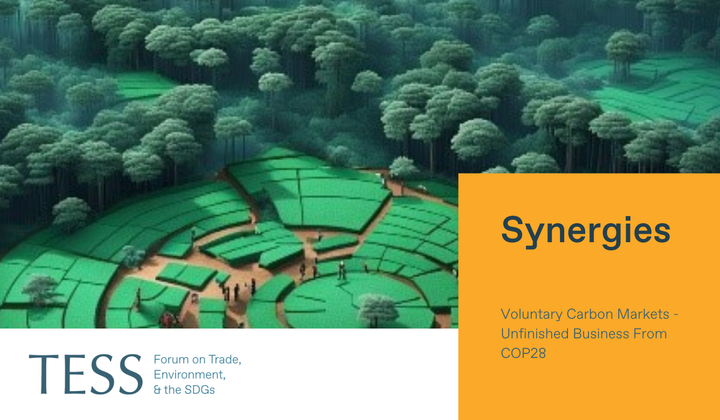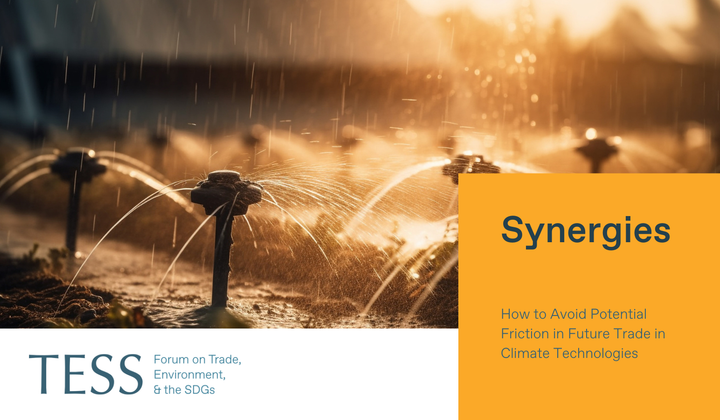The trade and investment regime needs to provide incentives for low-carbon, socially inclusive, and climate-resilient forms of economic activity while also discouraging the business-as-usual pathway that is inflicting enormous costs and inefficiency to the world economy.
This article is part of a Synergies series on reviving multilateralism curated by TESS titled From Vision to Action on Trade and Sustainability at the WTO. Any views and opinions expressed are those of the author(s) and do not necessarily reflect those of TESS or any of its partner organizations or funders.
-----
Each member of the World Trade Organization (WTO) and the Group of 20 (G20) has signed on to the United Nations 2030 Agenda for Sustainable Development to meet a set of ambitious climate and development goals by the end of this decade. To meet these goals, there needs to be a rapid structural transformation of the world economy towards low-carbon, socially inclusive, and resilient growth trajectories.
The G20 estimates that emerging market and developing countries (not including China) need to mobilize upwards of $3 trillion annually in order to make such a transformation. While the International Monetary Fund (IMF), the World Bank, and other multilateral development banks have moved to align themselves with the 2030 Agenda, the WTO remains an outlier. As the only global and rules-based institution established to set the parameters of global trade, and increasingly investment, it is imperative that the WTO becomes aligned with the 2030 Agenda.
Five Structural Transformation Pathways for Developing Countries
The core task is to change the structure of the world economy from one that is inherently unequal and reliant on fossil fuels to one that is low-carbon, socially inclusive, and climate resilient.
The core task, as noted, is to change the structure of the world economy from one that is inherently unequal and reliant on fossil fuels to one that is low-carbon, socially inclusive, and climate resilient. There is no “one size fits all” set of policies for this, but all countries will have to move from one set of comparative advantages to another. In a recent article, we simplify these transitions into five general structural transformation pathways for developing countries:
- First movers, countries that need to mobilize capital in order to invest in a new capital stock where little capital exists in the first place. For instance, in much of sub-Saharan Africa, there is a lack of manufacturing capabilities and appropriate grid connectivity to harness the abundance of clean energy sources and consumer demand of a rapidly growing continent.
- New winners, where states that are blessed with the vital “transition materials” and industries that form the basis of a new economy can work to harness those resources, increase value addition, and strengthen economy-wide linkages in a manner that ensures macroeconomic stability, shared prosperity, and environmental sustainability, not only globally but where these materials are generated.
- Large emitters and future large emitters, which need to make massive investments to replace the existing capital stock through structural change away from fossil fuel production and consumption patterns towards clean energy, energy efficiency, and beyond.
- Fossil fuel extractors, which are not high carbon emitters themselves but whose economies are dependent on exporting fossil fuels and need to diversify their economic base and change the structure of their economies towards new sources of foreign exchange and exports while buttressing themselves from “transition spillovers” that arise from the global shift away from fossil fuels.
- Climate-vulnerable economies, which need to mobilize capital in order to reinforce their existing capital stock to adapt to climate change, build a new climate-resilient capital stock, and become more resilient to loss and damage from climate shocks.
Of course, many economies will have to work on all five fronts. This project should inherently be one for national development strategies but should also be guided by a global economic governance regime that supports those strategies. The WTO needs rules that create the incentives to go in a green and inclusive direction, multilateral development banks should provide financing to put wind in the sails of these incentives and help countries in the adjustment process, and the IMF should help countries respond to climate shocks and quickly get them back on track towards climate-resilient development.
Needed Trade and Investment Regime Incentives
Policy space and fiscal space are two important contributions that global economic governance can provide, while also ensuring that the pursuit of one country’s new development strategy does not prevent other countries from meeting their own climate and development goals. Put simply, the trade and investment regime in general, and the WTO in particular, will need to provide incentives for low-carbon, socially inclusive, and climate-resilient forms of economic activity while also discouraging the business-as-usual pathway that is inflicting enormous costs and inefficiency to the world economy. This will be manifest in five key areas.
Policy space and fiscal space are two important contributions that global economic governance can provide, while also ensuring that the pursuit of one country’s new development strategy does not prevent other countries from meeting their own climate and development goals.
First, fossil fuel tariffs should be increased and renewable energy tariffs reduced, helping incentivize the energy transition. The current structure of the tariff system is implicitly subsidizing emissions. Joseph Shapiro estimates that the annual implicit subsidies from tariffs are roughly $550–$800 billion annually, implicitly paying economic actors around $100 per tonne to emit carbon dioxide. In other words, trade policy is currently giving the exact opposite price signal than the one needed for climate action.
Second, fossil fuels must be phased out, and green industrial policy must be ramped up. The IMF reckons that explicit and implicit fossil fuel subsidies worldwide now top $7 trillion. These subsidies need to be equitably phased out and poured into green industrial policy that stimulates new growth paths, especially in emerging markets and developing countries. The IMF estimates that “scrapping explicit and implicit fossil-fuel subsidies would prevent 1.6 million premature deaths annually, raise government revenues by $4.4 trillion, and put emissions on track toward reaching global warming targets. It would also redistribute income as fuel subsidies benefit rich households more than poor ones.”
Third, new rules should be established for the diffusion of clean technologies. The world economy will need a mass diffusion of technology and know-how for the new climate economy in order to meet shared climate and development goals in an equitable manner. Most multilateral development banks have now banned investment in upstream oil and gas, as well as coal in all its forms. The WTO needs to rapidly align with such an approach, disincentivizing investment in brown technologies and loosening investment rules for green and inclusive technology. Such an approach will need to be supported by intellectual property rules that allow nations to rapidly share technology.
Fourth, all of this must be supported by deeper governance reform. Despite its flaws, the WTO’s Appellate Body at least ensured that rules—and not only power—helped settle trade disputes. Procedural and substantive reforms could ensure the Appellate Body does not replicate mistakes of the past. Moreover, outside the WTO, the numerous regional trade agreements and bilateral investment treaties with investor-state dispute settlement will need to be reformed or countries should withdraw from them, as countries are now doing from the controversial Energy Charter Treaty.
Fifth, development finance needs to back development goals. Policy space alone will not enable the rapid transformation necessary to meet our climate goals: even if trade rules do not block countries from using measures like subsidies, their ability to do so depends on drastically varying levels of fiscal space. A stepwise increase in development finance is needed to not only help countries make green transitions but also ensure that such a transition is just, both within and across borders. If advanced economies implement carbon border taxes, rather than punishing developing countries that often lack the financial resources to transition to green economies, they would remit the fees to advance a just transition in developing countries—which will also help them chart foreign exchange pathways such that they are not reliant on fossil fuel exports for stability and growth.
Policy space alone will not enable the rapid transformation necessary to meet our climate goals: even if trade rules do not block countries from using measures like subsidies, their ability to do so depends on drastically varying levels of fiscal space.
A Trading System That Rises to the Challenge
It's not too late to create a healthy and balanced trading system. The resurgence of policy space in the trading system in recent years is welcome, as is the recognition of the importance of climate action; but to abandon multilateral trade cooperation is not the solution. Countries can come together to create a trading system that rises to the challenge of climate change. But time is running out for policymakers to do it.
-----
Kevin Gallagher is the Director of the Boston University Global Development Policy Center and professor of Global Development Policy at the Boston University Pardee School of Global Studies.
Tim Hirschel-Burns is the Policy Liaison for the Global Economic Governance Initiative at the Boston University Global Development Policy Center.
-----
Synergies by TESS is a blog dedicated to promoting inclusive policy dialogue at the intersection of trade, environment, and sustainable development, drawing on perspectives from a range of experts from around the globe. The editor is Fabrice Lehmann.
Disclaimer
Any views and opinions expressed on Synergies are those of the author(s) and do not necessarily reflect those of TESS or any of its partner organizations or funders.
License
All of the content on Synergies is licensed under a Creative Commons Attribution-NonCommercial-ShareAlike 4.0 International (CC BY-NC-SA 4.0)
license. This means you are welcome to adapt, copy, and share it on your platforms with attribution to the source and author(s), but not for commercial purposes. You must also share it under the same CC BY-NC-SA 4.0 license.
If you would like to reuse any material published here or if you have any other question related to Synergies, send an email to fabrice.lehmann@graduateinstitute.ch.



